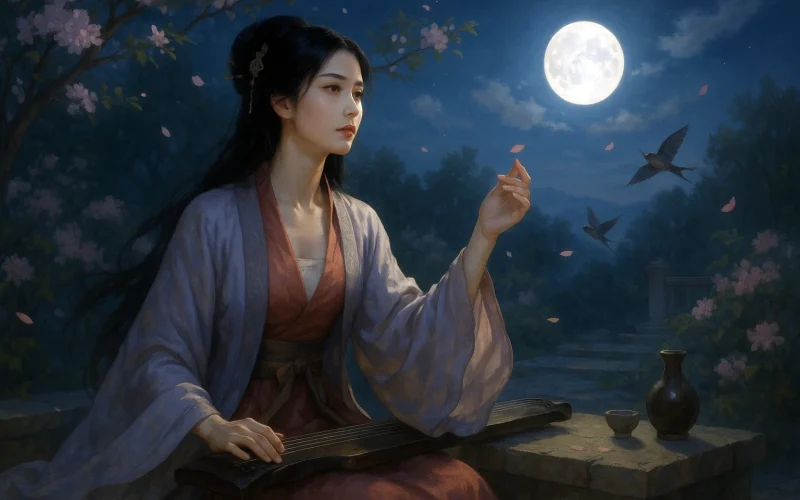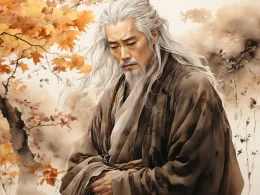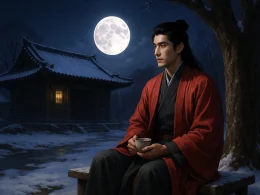There is no cloud in evening sky;
The vernal wind has warmed the eye.
A songstress loves the tranquil night;
She drinks and sings till first daylight.
As night is soon replaced by morrow,
How can the fair not sigh with sorrow?
The moon looks brighter amid cloud;
The flower among leaves seems proud.
Every beauty has her day,
But how soon will it pass away!
Original Poem
「拟古 · 其七」
陶渊明
日暮天无云,春风扇微和。
佳人美清夜,达曙酣且歌。
歌竟长叹息,持此感人多。
皎皎云间月,灼灼叶中华。
岂无一时好,不久当如何?
Interpretation
Composed around 421 AD when Tao Yuanming was approaching sixty, this poem reflects his deep immersion in rural seclusion and profound meditation on life's transience. Set against a serene spring nightscape, it depicts a beautiful reveler's shift from joy to melancholy, conveying the poet's poignant awareness of fleeting youth and life's impermanence, while revealing an underlying reverence for existence itself.
First Stanza: "日暮天无云,春风扇微和。"
Rì mù tiān wú yún, chūn fēng shān wēi hé.
Sunset reveals cloudless skies,
Spring breezes stir gentle sighs.
The pristine evening scene establishes an atmosphere of perfect tranquility and beauty.
Second Stanza: "佳人美清夜,达曙酣且歌。"
Jiā rén měi qīng yè, dá shǔ hān qiě gē.
The fair one graces this clear night,
Singing, drinking till morning light.
Youthful exuberance fills the harmonious night with unrestrained celebration.
Third Stanza: "歌竟长叹息,持此感人多。"
Gē jìng cháng tàn xī, chí cǐ gǎn rén duō.
When songs end, long sighs arise—
Such moments stir the wise.
The sudden transition from revelry to melancholy evokes universal resonance.
Fourth Stanza: "皎皎云间月,灼灼叶中华。"
Jiǎo jiǎo yún jiān yuè, zhuó zhuó yè zhōng huá.
Bright, bright moon between clouds glows,
Lush, lush blooms midst foliage shows.
Nature's radiant beauty mirrors human glory's ephemeral brilliance.
Fifth Stanza: "岂无一时好,不久当如何?"
Qǐ wú yī shí hǎo, bù jiǔ dāng rú hé?
Though splendor fills this hour,
What follows when it fades its power?
The piercing rhetorical question lays bare life's inevitable cycles of flourishing and decay.
Holistic Appreciation
Set against the luminous backdrop of a spring night, this lyrical composition traces an organic emotional arc from joyous revelry to poignant meditation on life's brevity, imbued with profound philosophical resonance. The opening verses establish a serene nocturnal tableau - crystalline skies and balmy breezes crafting an atmosphere of tranquil warmth, within which a beautiful maiden sings freely, embodying life's vibrant exuberance. Yet this celebration gives sudden way to lingering sighs, marking a poignant tonal shift that voices the poet's lament over time's inexorable passage and youth's evanescence. The subsequent imagery of moonlit clouds and resplendent blossoms serves as nature's metaphor for transient splendor, deepening the thematic exploration through scenic allegory. Culminating in a rhetorical question of exquisite restraint, the final couplet articulates with quiet power the poet's resigned melancholy before life's impermanence and aging's inevitability. Throughout, the poem maintains a refreshing linguistic clarity, its genuine sentiment flowing through seamless transitions, all enveloped in an autumnal hue of tender sorrow.
Artistic Merits
This poem masterfully transitions from joy to sorrow, revealing Tao Yuanming’s nuanced and profound emotional depth. He skillfully mirrors human experience through natural imagery—the radiant moon and resplendent blossoms serving as metaphors for life’s fleeting beauty and impermanence. The language remains unadorned yet resonant, achieving remarkable depth through simplicity. The seamless interplay of vivid description and philosophical reflection guides readers from aesthetic appreciation to poignant meditation on time’s passage, evoking an instinctive sense of life’s brevity and the preciousness of each moment.
Insights
This poem illuminates a fundamental truth: we must cherish life's beautiful moments wholeheartedly, for worldly affairs are ever-changing, and youth's splendor fades as swiftly as spring blossoms. Tao Yuanming, with his characteristically unembellished brushstrokes, first paints a scene of nocturnal revelry before turning abruptly to lament life's brevity—a poignant reminder that while we should delight in beauty and embrace joy, we must also remain acutely aware of life's finite nature. This threefold wisdom—treasuring the present, awakening to impermanence, and transcending attachment—cultivates clarity and composure amid life's turbulence, allowing us to navigate uncertainty without becoming lost in fleeting glamour.
Poem translator
Xu Yuanchong (许渊冲)
About the poet

Tao Yuanming(陶渊明), 365 – 427 CE, was a poet, literary figure, fu writer, and essayist active during the late Eastern Jin and early Liu Song dynasties. Born in Chaisang (near present-day Jiujiang, Jiangxi Province), he pioneered a new genre of pastoral-themed literature, expressing profound philosophical insights through simple language. His poetic style became an enduring aesthetic standard in classical Chinese poetry.












